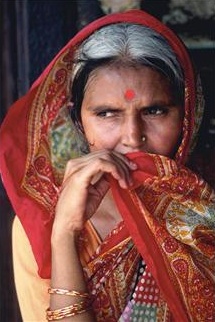An Aberdeen computer scientist is leading the UK input into an exciting new international research project as part of the UK Government’s commitment to collaborate with India on research addressing pressing problems facing the world today.
The aim of the three-year project is to explore the potential of trusted mobile technologies to improve the management of chronic diseases in rural areas of the UK and India.
This is part of a £7 million package of projects called Bridging the Urban and Rural Divide (BURD) which is being funded in the UK by the Research Councils UK (RCUK).
TRUMP (Trusted Mobile Platform for the Self-Management of Chronic Illness in Rural Areas) is a three-year ‘m-health’ project being led in the UK by Professor Peter Edwards of the University of Aberdeen. In the UK the project involves the universities of Aberdeen, Newcastle, City, Lancaster and Northumbria.
Indian partners in TRUMP are the Indian Institute of Management Ahmedabad (India lead), International Institute of Information Technology Bangalore, Indian Institute of Technology Bombay, Indian Institute of Technology Kharagpur, All India Institute of Medical Sciences and the National Institute of Health and Family Welfare, both in New Delhi.
The total value of the funding awarded is £2.9 million, with £1.7 million of this going to the UK partners.
This new award expands the programme of work associated with the RCUK dot.rural research hub established at the University of Aberdeen in 2009 to push forward the use of advances in digital technology to revolutionise the lives of people living in vulnerable rural communities. Also working on TRUMP at Aberdeen will be computer scientist Professor Tim Norman and experts in mental healthcare Professor Ian Reid and Dr Isobel Cameron.
Professor Edwards describes the significance of the funding award saying: “We have been able to assemble a world class team of computer scientists, designers, clinicians and social scientists from the UK to work with our colleagues at leading research institutions in India to investigate the complex social and technical issues surrounding the use of mobile technologies in healthcare. This project has the potential to be the most significant and comprehensive dual-country m-health research effort to date and I expect the next three years to be incredibly exhilarating.
“Trust lies at the centre of any m-health solution. Patients must feel that systems have been designed by and for 'people just like them' and must be confident that their medical information is managed in a secure and reliable fashion. Healthcare professionals must have confidence that systems cannot harm the patient, and policy makers want to be satisfied that systems take account of drivers for future health services and enterprises. Developing a 'platform' which combines the necessary hardware and software elements to meet these requirements is the focus of TRUMP.”
Two common chronic conditions, diabetes and depression, have been chosen as the topics for the development of the platform and its evaluation.
TRUMP will involve academic researchers from different disciplines working with partner organisations across the business and community sectors. The team will perform a detailed analysis of the healthcare context, design sustainable technology solutions compatible with local and national healthcare policies, and incorporate existing proven chronic management programmes and training. New patient record systems, mechanisms for tracking the patient (symptoms and behaviour), and raising awareness of how the patient can manage their condition are all expected outcomes.
Chronic diseases are now leading causes of death in both developing and developed countries. In the UK the cost of care of people with chronic conditions consumes the majority of health and social care resources and accounts for over 80% of GP consultations. While the UK and India have very different practices and structures for healthcare delivery, the effective management of chronic illness is a priority for both countries. Patients in rural areas pose particular challenges. This is particularly relevant to India with 71% of the population in rural areas. While fewer than one in five people in the UK are rural dwellers, large parts of the country are sparsely populated - for example in Scotland where 29% of the population live in rural areas.


